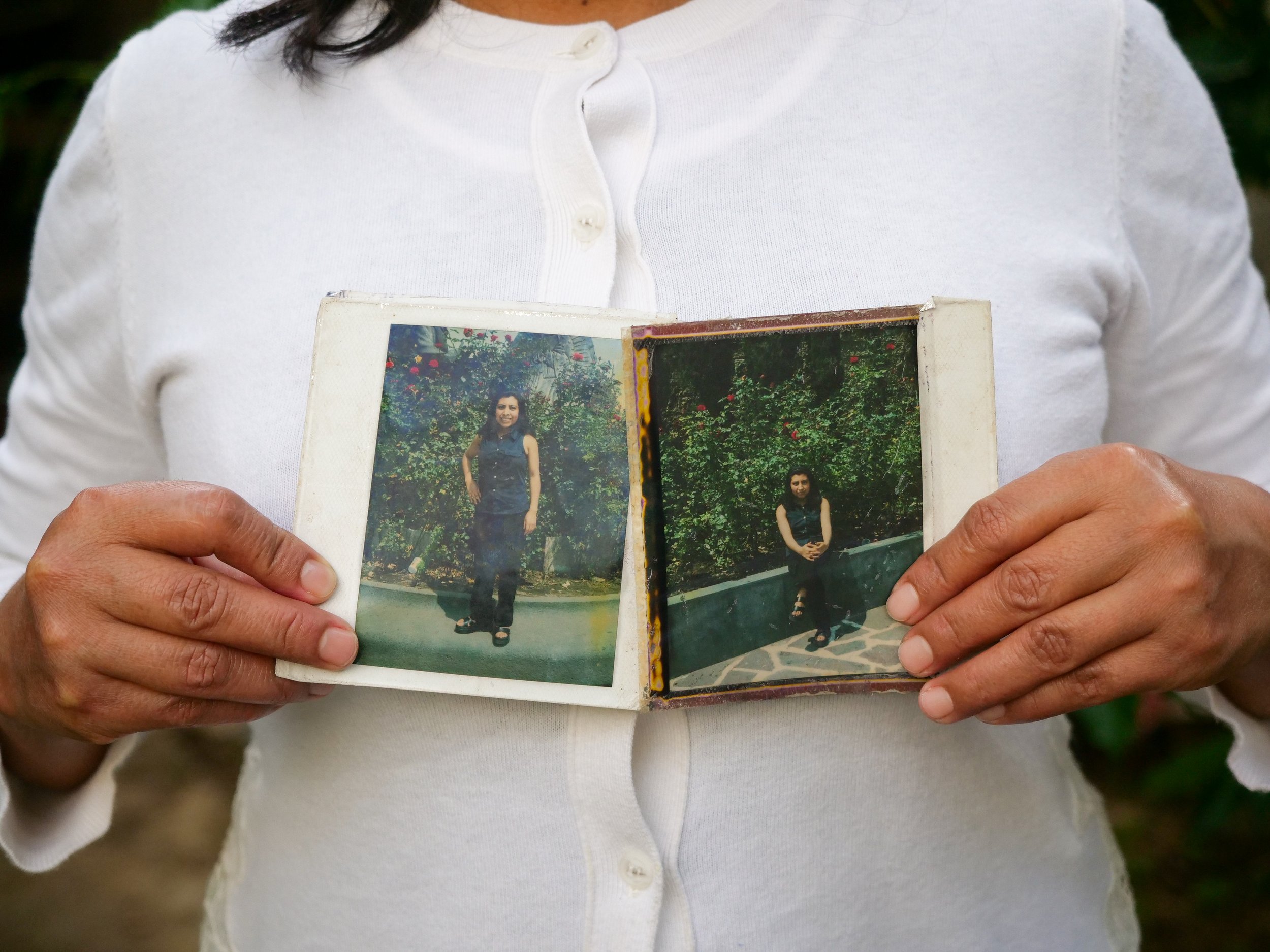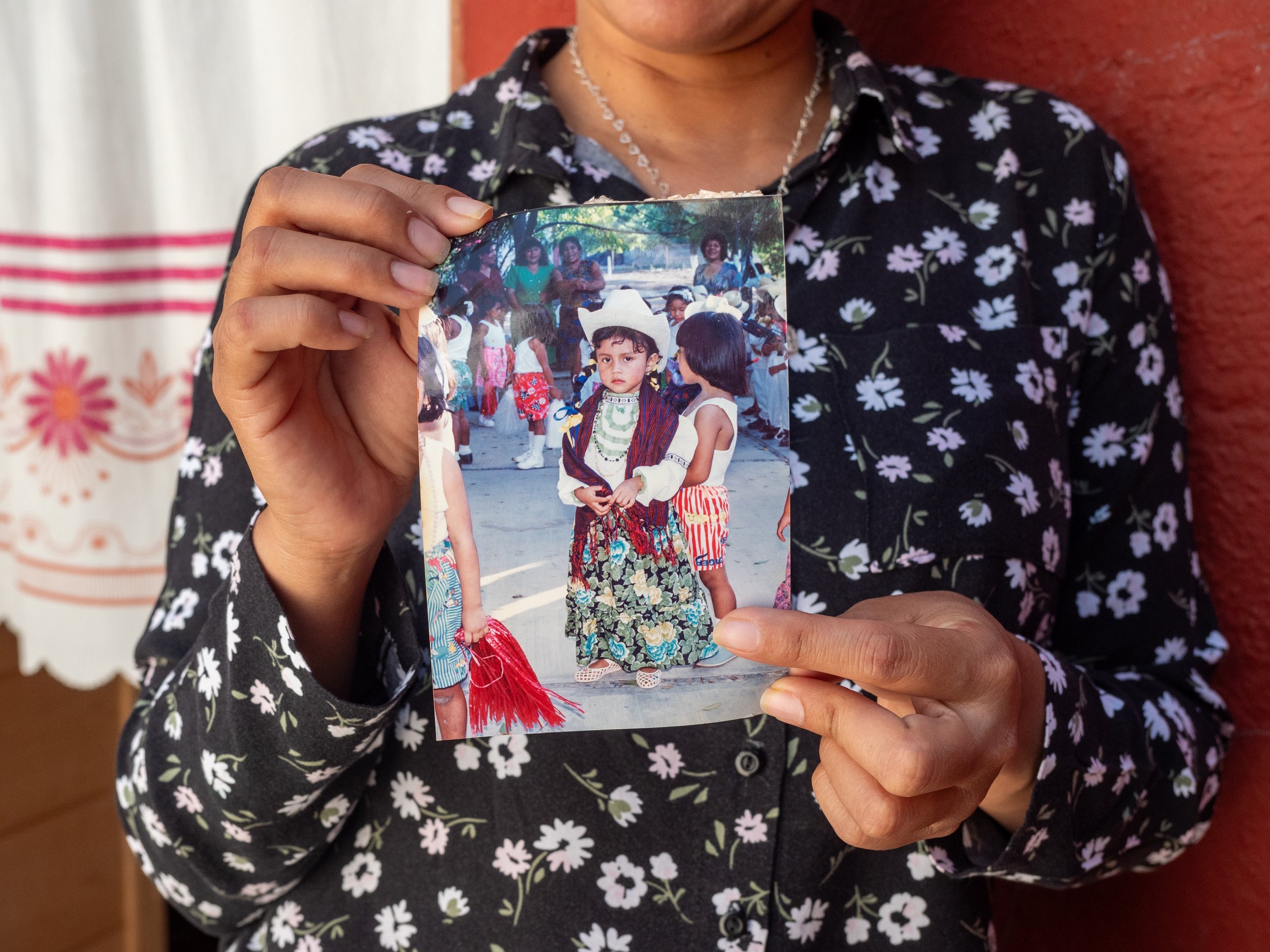
Monica finds solace sitting under a familiar tree in Bombilla Park, located in the southern part of Mexico City. The tree holds a special place in her heart, as it is where she played with her siblings during her childhood. During her tumultuous years in a violent partnership, the park became her sanctuary where she could escape and remember her happy memories. Today, Monica returns to the park to reclaim the space and find peace once again. Through a collaborative effort, we captured her portrait, empowering her and representing the freedom and peace she now experiences in her life.

Monica gazes out the window of her employer's home in Coyoacan, one of the many households where she works as a domestic worker throughout Mexico City. Despite once being a top-performing student with aspirations of becoming a sociologist, Monica was forced to give up her education by her abusive ex-partner. Finding work as a domestic worker empowered her economically and allowed her to leave her violent relationship. Today, she and her new partner support her three children, but Monica hasn't given up on her dreams. Once her youngest child is old enough, she plans to return to school to pursue her education once again.

Monica proudly displays a photo on her phone of herself with her three children. In her quest to combat machismo, Monica has taken on the responsibility of educating her children on feminism, with her eldest son recently expressing gratitude for being removed from a dangerous situation. "It impacted me," Monica says, "he was three years old back then, and still, he could remember why we left."

Barbara gazes fondly at her two children playing, while seated next to a painting of a serene angel. The angel serves as a poignant symbol of Barbara's unyielding religious convictions that have helped her endure immense hardships, including a tumultuous divorce from her influential ex-husband, a notary with considerable power. The painting hangs in a prominent location, where a beloved landscape once graced the wall before it was stolen during a violent police raid on her home. The raid, orchestrated by her ex-husband, left Barbara and her family traumatized and robbed of important documents and possessions. Despite the losses she has suffered, Barbara remains resolute in her determination to persevere, driven by the powerful reminder of what she has endured and her unwavering faith.

Barbara with one of the fifty dogs she and her sister care for in their home in the state of Mexico. Barbara and her family are living in fear due to death threats and are unable to leave their home safely, while their battle with a corrupt court system and the hefty lawyer fees and fines they've incurred have left them financially depleted. Despite these challenges, the sisters have ingeniously turned to taking care of their affluent neighbors' dogs to support themselves and their fight for justice. For Barbara, the dogs are not only a source of income but also a source of joy and comfort as she finds solace in their company.

Barbara holds a folder of legal statements that bear witness to a momentous occasion in her life. Recognized by the Comisión of Human Rights in Mexico City, Barbara is now officially acknowledged as a victim of gender-based and familial violence at the hands of her ex-husband. This government institution is committed to promoting and protecting human rights in Mexico City, offering vital support and assistance to those affected by familial violence and other violations of their human rights. For Barbara, this moment represented a powerful turning point. As she recalls, "It was like the government was finally saying, we believe you, and suddenly I was not alone.”

In a powerful act of self-reclamation, Reina takes control of her own narrative through the medium of facilitated self-portraiture. Posing proudly on her rooftop after a long day working as a domestic worker at her "patrones" house, Reina basks in the sense of security that comes with knowing that she and her son are safe under this roof. This stands in stark contrast to her last living situation, where she experienced harassment and assault from a male neighbor and unwelcome visits from her abusive ex-husband. Through a collaborative process, we worked together to create a portrait that reflects Reina's unique perspective and celebrates her strength and resilience.

In San Felipe del Agua, Oaxaca, an area renowned for its spacious, sun-filled homes, Reina diligently goes about her work as a domestic employee. Living in the nearby working-class neighborhood of Volcanes, she has built a reputation as a skilled and dedicated cleaner, with many long-lasting clients in the upscale neighborhood. In the picture, she is seen carefully cleaning a large window at one of her employer's homes, a task she has been doing for almost eight years.

Reina holds two old photographs of herself as a teenager, a testament to her difficult journey as a domestic worker in Mexico City. As the oldest daughter in her family, she left home and school at the age of 11 to support her loved ones. Her work in the city was a constant struggle, with long hours, little pay, and at times abusive treatment. She returned to her hometown after becoming pregnant with her son Alex, but the respite was short-lived. In order to support her family, Reina had to leave her son behind for several years before she could bring him with her to work.

Fighting against tendencies of re-victimization after leaving a violent marriage, Luciana reclaims her narrative through facilitated self-portraiture where she poses with her latest artwork made from her 700-page divorce file. Through a collaborative process, we worked together to design her portrait considering how she wants to be seen and how she wants to feel while taking her picture. This portrait series serves as a testimony of female empowerment and individual resilience and a counter-narrative to victimhood.

Luciana and her mother sit in her mother's living room in Roma Norte, Mexico City, surrounded by their house pets. Luciana had to leave her previous residence where her ex-husband still resides and has since found refuge in her mother's home. A portrait of her mother in her youth hangs above them, serving as a poignant reminder of the enduring legacy of female strength that runs through her family.

Luciana tenderly holds a picture of herself at a younger age while pregnant with her son, and holding hands with her beloved daughter.

Jenn sits on her bed in Acapotzalco, Mexico, a gated community where she used to live with her ex-husband and children. However, after her husband took her children away under false accusations, she suffered from vicarious violence. The court's closure during the Covid-19 pandemic made it even more challenging to disprove the allegations, leaving Jenn in a state of uncertainty and anguish. Her bed became her safe haven during those difficult years, where she would sit and contemplate her children's whereabouts. Despite Mexico's legal system's motto of "innocent until proven guilty," Jenn believes that women are still viewed as "guilty until proven innocent."

Jenn watches with joy as Matteo tries out his new bike, savoring this precious moment of togetherness. After two years of separation caused by false accusations and manipulations by her ex-husband, Jenn finally reunited with her children just a month ago. Now, with the legal battle over, Jenn and her children face a new challenge - to rebuild their connection and trust after so much pain and trauma. But with simple moments of joy and play like this, Jenn and Matteo are slowly finding their way back to each other.

Jenn holds a photograph of herself and her children, taken two years ago, a week before she dropped them off for a custody visit with their father, but never got them back. Despite the fact that she missed out on precious moments, such as watching her daughter grow into a teenager, she is overjoyed to have her children back in her life.

Socorro, standing beside her daughter Marely on a hilltop overlooking Oaxaca, captures their portrait together—an act rich with personal significance. This spot near their home is where Socorro finds solace on weekends, away from the strains of her daily life. As a domestic worker, a mother of three, and the caregiver to her ailing husband who is thirty years her senior, Socorro navigates immense challenges. She speaks of seeking mental liberation from the violence that has shadowed her various roles. Her bond with Marely is pivotal; it offers a path to healing, allowing her to provide the love and opportunities she herself was denied.

Socorro waters the garden in an affluent neighborhood of Oaxaca, where she has worked as a domestic cleaner since she was thirteen. Leaving her economically struggling family behind, she moved to the city to work. Over the years, Socorro has served as a dedicated cook, cleaner, and gardener for more than ten families, spending the last six years with her current employers.

Socorro carefully holds the only photograph from her childhood, taken in her hometown. "These were the happiest days of my life, before my brother died, before things got really tough," she reflects. "I like to remember these days, but it feels like another life," she adds.

Itzel stands tall among the sweeping grasses of her favorite park in Huayapam, Oaxaca. With a digital clicker in hand, she captures her own image—an act of self-empowerment. Itzel is not just any elementary school teacher and single mother; she is a survivor. For years, she endured domestic violence and a chilling attempt on her life by her ex-partner. But Itzel managed a daring escape with her children and forged a new life in the city. Today, through personal healing and psychology, combined with her activism, she offers hope and guidance to other women trapped in similar nightmares. She is a beacon of resilience, using her voice to raise awareness about gender-based violence and empowering women to reclaim their own narratives. Nature also plays a crucial role in her recovery, serving as a sanctuary where she connects with her children and mother, reaffirming life’s gentler rhythms.

As Itzel listens to her young students excitedly share stories about water in their community, she is reminded of why teaching has always been a cornerstone in her life, offering stability when little else could. Her deep connection with education not only sustained her spirit; it also provided the means to leave her abusive ex. After securing a position at a primary school in the city, Itzel found herself surrounded by a supportive community of colleagues. Their aid was crucial in helping her break free from the cycle of violence and build what became a second family. In her classroom and at home, Itzel champions empathy and understanding through a gender-focused lens, believing that the key to supporting future generations of women lies in educating today's youth toward equity.

Holding a childhood photo of herself, Itzel gazes at the young face staring back—a face as young as those of her students today. "Look at that face," she muses, "what must I have been thinking?... if only I'd grown up with the education of the children today..." Her voice trails off, laden with a mix of regret and hope, before she adds, "I hug that little girl version of myself still in me."
